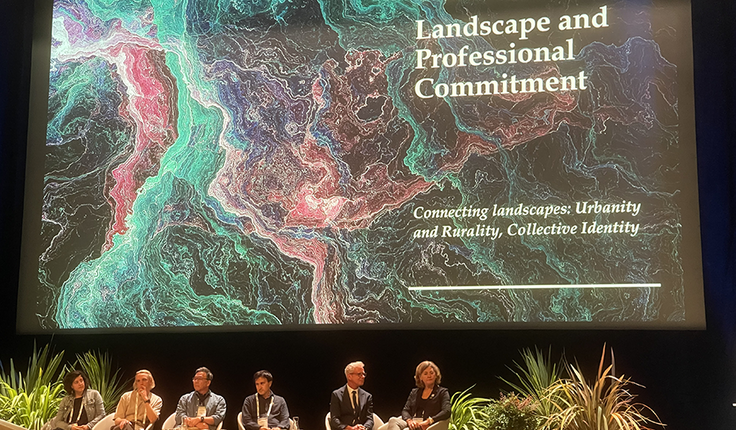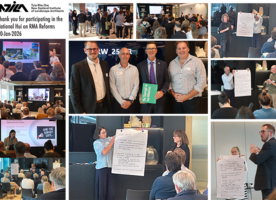News
Guiding Landscape. The 2025 IFLA World Congress.
Posted 15 09 2025
in News

Ralph Johns writing from Nantes, France
The overarching theme of the 2025 IFLA World Congress in Nantes asked the question “how should we respond and adapt to a volatile world of social and environmental crises for which human activities have been largely responsible?”
There were 1,400 attendees from 60 countries present to take part in the discussion. I have never seen so many landscape architects in one place; a global community focused on a single goal - the climate emergency.
We heard about heatwaves, fires and floods and how regenerated rivers, restored soils and reinvented communities can help to us to adapt to these increasingly common, climate-induced events.
A range of speakers, mostly landscape architects talking to landscape architects, violently agreed that nature based solutions (aka landscape-based actions and regenerative design) should lead the way, and that landscape architecture should be at the forefront of climate adaptation - our profession at the heart of multidisciplinary collaborations.
President of the Fédération française du paysage Henri Bava called for landscape architecture education to be rooted in what matters most, the living world, the soil and ecological dynamics. Landscape architecture should be scientific, cultural and creative he said.
Jellicoe Award recipient Günther Vogt stressed the importance of interdisciplinary critique for students to help prepare them to lead the new wave of climate adaptation work.
Theorist Charles Waldheim talked, at a thousand miles an hour, about how landscape architects should be the foremost urbanists, and warned against dividing planning from design.
From both designers and client we learned about the long term regeneration of the Île de Nantes, an island in the middle of the Loire that was home to a bustling shipbuilding industry.
Twenty-five years ago French landscape architect Alexandre Chemetoff produced the first of his Plan-Guides, an anti-masterplan approach that constantly updated two plans for the island, one existing and one in the future. The project existed in the present somewhere between the two plans.
The city agency established to lead the development and hold the vision has recently engaged its fourth design team, a collective that brings fresh ideas and continues to evolve and deliver the plan.
Their “alliance with nature” aims to do more with less. It has made the process fun, setting up a citizen’s assembly to help with decision making and move quickly through trials, adaptive strategies and strategic opportunism.
Dirk Sijmons from Holland suggested ways in which landscape architects can work in the Anthropocene.
Someone has calculated that the mass of man-made stuff on the plant now is heavier than all natural things, and it’s set to double in the next few years, so “build lightly” he says! He warned us not to get too cocky about what we can solve with spatial planning, that architecture can’t solve all our problems, and maybe landscape architecture can’t actually save the world.
But Kongjian Yu, founder of China’s Turenscape and sponge city advocate, definitely thinks that we can. He shared many examples of his work in which landscape-based solutions are employed in place of hard, grey engineering (concrete and pipes).
His ‘Sponge planet’ approach uses landscape actions such as terracing, weiring, ponding and cut-and-fill islanding to embrace water and create floodable landscapes alongside rivers and in city parks. He’s become famous for turning grey to green, and creating resilient, large scale landscape projects that embrace natural processes and connect with people.
After three days of listening to leading thinkers, networking with landscape architects from all over the world and exploring the city of Nantes, I’m tired but perhaps better connected than ever with the contemporary concerns of the global profession.
We probably won’t be able to save the world, but we can at least try.
09 Feb
Weekly international landscape, climate and urban design update

Monday 9 February
This is your weekly international snapshot of what’s happening across landscape architecture, climate adaptation and urban design. Drawing on credible …
02 Feb
RMA Reform submission update

Call for feedback and images
Submission framework The Environmental Legislation Working Group thanks all members who made the effort to join us at the national …
02 Feb
Weekly international landscape, climate and urban design update

Monday 2 February
This is your weekly international snapshot of what’s happening across landscape architecture, climate adaptation and urban design. Drawing on credible …
Events calendar
Full 2026 calendar